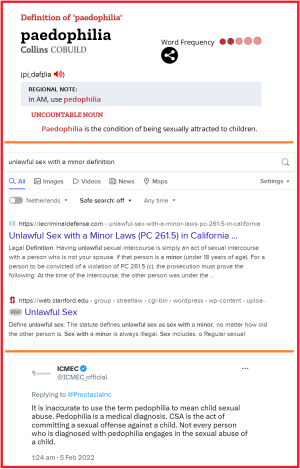One of our staff members is contributing considerably to a News Archiving service at Mu. Any well educated (Masters, PhD or above) users who wish to make comments on news sites, please contact Jim Burton directly rather than using this list, and we can work on maximising view count.
Debate Guide: Misdefinitions and Rhetorical Manipulation
To promote a consistent and amicable debate, you must be on the same page as your opponent with language. Opponents will misdefine common phrases in order to get away with indefensible arguments. As far as labelling is concerned, remember to make the point that there is no such thing as 'the pedophile', no more so than 'the heterophile/homophile'. Minor attracted people have no essential characteristics that distinguish them, save that their attractions are strongly directed towards younger people. Therefore, MAPs should not be the exclusive targets of depersonalization. Point out the following examples:
Pedophilia

- Misdefined as: "Child Sexual Abuse", "a crime", "Minor-adult sex", "pornographic material", "attraction to minors", "attraction to a considerably younger person" or a "social issue/problem/topic".
Pedophilia is a sexual attraction towards prepubescent children. Dictionaries provide basic definitions, e.g. 'sexual desire directed towards children' (Oxford, 1991), and sometimes specify the colloquial uses. Abuse of a child should not automatically qualify a person as a Pedophile, as the etymology of Pedophilia does not relate to behavior.
Pederast
This is a word for a man who interacts 'sexually' with adolescent/pubescent boys. It derives from "boy love" the combination of “παίδ-” (the Greek stem for boy or child) with “ἐραστής” (Greek for lover; cf. “eros”). It has been manipulated in modern times, so that it refers to the anal penetration of underage boys, homosexuality, or any form of child rape.
Hebephilia and Ephebophilia
You can introduce these chronophilias alongside a critique of your opponent's definitions. Hebephilia is defined as a sexual attraction towards pubescents. Ephebophilia is more controversial, since the target (post pubescent youth, sometimes defined as late teens) is sexually mature and most probably teleiophilic.
Abuse, molestation
These terms may be adopted by your opponent, but should be challenged, and not adopted as parameters of debate. Use more neutral terms yourself, such as "minor", "teen", "age-discrepancy", "sexual"/"genital contact", "intimacy".
One notable problem is when someone may quote a studies that conclude that "child sexual abuse" is uniquely and intensively harmful. These false-diagnostics are based upon methodological and sampling flaws that are as common as they are predictable. Thankfully, methodology has been improving over the last couple of decades, with many of the confounding variables being weeded out. Still, you must point out precisely how the evidence conflicts with theirs, instead of just linking it.
Fucking
This is an objectifying term that presents sexual intimacy as something that is done by an older partner unto a younger one. It assumes penetration and has coercive overtones. A reasoned debate can only be had if the very definitions that we use are objective, and preferably shared by all sides of a debate. The well-known author and feminist, Patrick Califa, has noted that if engaging in sexual relations with their partners, boylovers generally show more concern for the pleasure of their partners than does the average heterophile.
'Normal' / 'Normality'
If your opponent uses this term, be sure to point out that it is an entirely relative concept. You should suggest that 'normal' only means "relatively common". Female inferiority? Slavery? White supremacy? Castration of sexual deviants? All of these were considered normal.
Rhetorical Manipulations
- We consider misuse of language an argument against the scheme as opposed to an advice section. See Debate Guide: Abuse of language.
The use of persuasive effect in language is an important part of debate. When possible, the use of superficial rhetoric, especially that which builds upon misdefinitions should be identified and dismissed.
"Sexual relationships" as an example
An opponent may deliberately or unknowingly profit from rhetorical effect by always describing adult-minor sexual interactions as "sexual relationships". Your opponent is mentally superimposing adult relationship models upon the hypothetical relationship in question. This western "adult" relationship model is constructed to satisfy the needs and rights of modern, western "adults", and not younger people. Another implication here, is that a relationship involving sexual intimacy, is necessarily and primarily a "sexual relationship". Other factors are neglected, since our preconception of a "pedophile" relationship is heavily biased; indeed, the sex is under an undue level of scrutiny.
Accounts and research might help us understand how these relations may develop under an emancipation model.